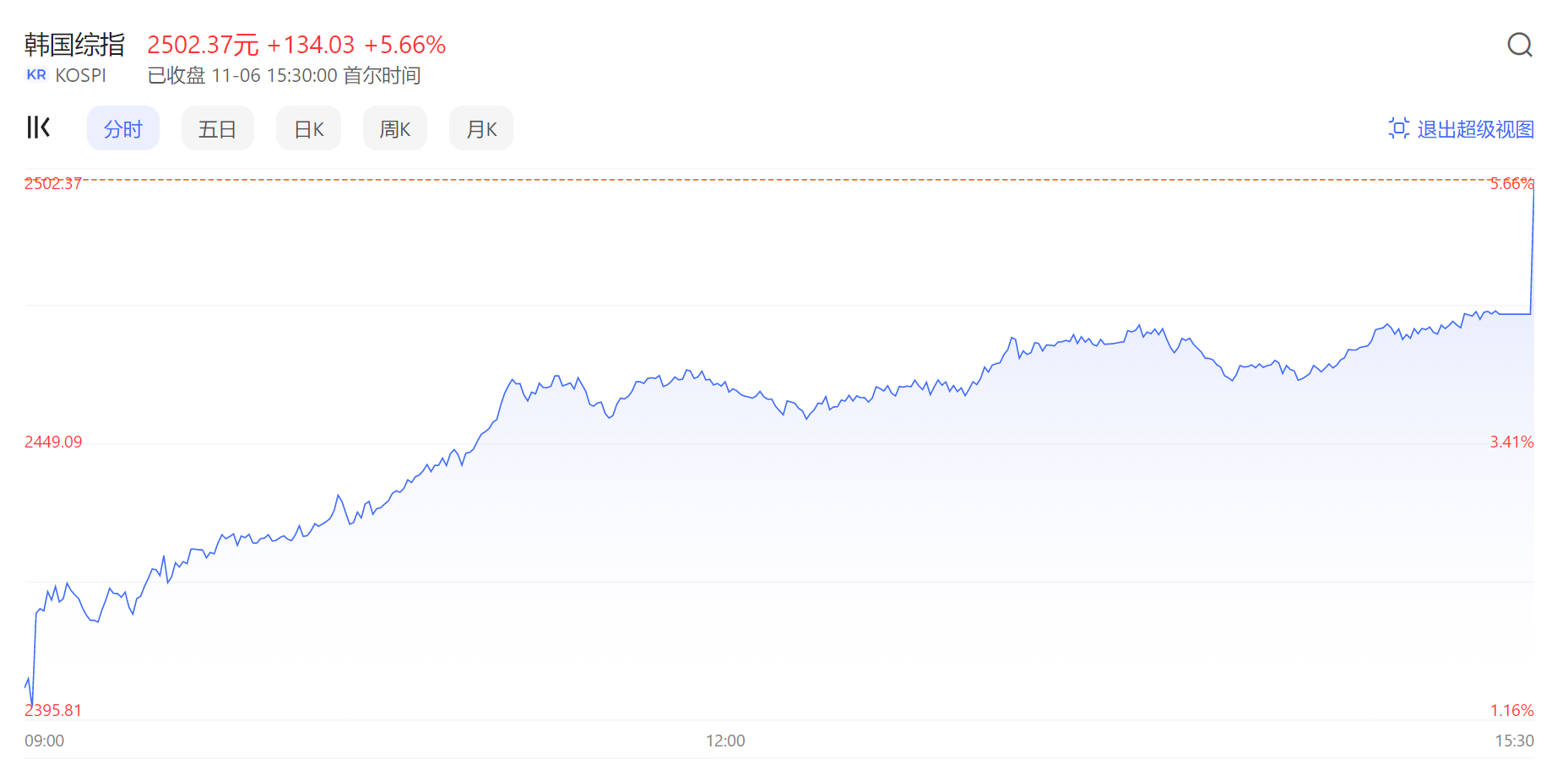Short-selling ban boosts sentiment South Korean stock index posts biggest one-day gain in three years
On November 5, South Korea's regulator said it would ban short selling by borrowing stocks in the Kospi 200 and Kosdaq 150 indices from November 6 until the end of June next year.。South Korean stocks post gains in first trading day after ban。
On November 5, according to local media reports, the Korea Financial Commission and the Financial Supervisory Board held a press conference, saying that from November 6 until the end of June next year, borrowing the constituent stocks of the Kospi 200 and Kosdaq 150 indices for short selling is prohibited, and the ban will not affect existing positions.。
The regulator said the move was so that it could improve rules and systems, and said that by June next year, South Korea's financial sector would assess the performance of financial markets before deciding whether to lift the ban on short selling.。
South Korean stocks surge in first trading day after ban。On November 6, South Korea's stock market composite stock price index Kospi 200 closed up 5.66%, the largest one-day increase since March 25, 2020。Stocks that have been sold short recently, including LG Energy and Posco Future, have welcomed overseas investors to cover their short positions, which has been the main driver of today's rally in the Composite Index.。On Monday, the Korean Composite Stock Price Index's turnover was 70% above its average over the past 10 sessions, according to NH Investment。Separately, the small-cap index Kosdaq 150 also rose 7.3%。

This is not the first time South Korea has issued an order banning short selling.。South Korea banned short selling during the 2008 global financial crisis, the 2011 Eurozone debt crisis, the U.S. sovereign rating downgrade and the 2020 epidemic.。The most recent ban was lifted in May 2021.。
Huh Jae-Hwan, an analyst at Eugene Investment & Securities, said the latest ban was unusual because, compared to before, the ban was enacted at a time when the authorities did not have significant external risks.。
While most of the short sellers on the Korean stock market are institutional investors, according to exchange data, their short selling size is currently only a small part of the market, about zero of the Kospi 200's market capitalization..6%, or 1% of the Kosdaq 150 market cap.6%。As a result, many people believe that the ban is clearly political.。
Wongmo Kang, an analyst at Exome Asset Management, said: "This current policy against short selling is groundless.。He added that because the Korean market tends to be heavily influenced by retail investors, many see this as a political move in response to next year's election.。
South Korea will hold a National Assembly election in April next year, and the domestic public's view of short selling remains very negative。Some ruling party lawmakers had urged the government to temporarily stop shorting stocks in response to demands from retail investors。Retail investors have staged protests from time to time and have also coordinated efforts to push stocks targeted by short sellers higher.。
Market watchers said the eight-month ban could help reassure retail investors by quelling their complaints about stock market shorting ahead of next April's election, but the move could also discourage foreign funds from participating in the country's stock market.。The current value of the country's stock market is about 1.7 trillion dollars。
Lee Bu-hyun, head of South Korea's Financial Supervisory Authority, dismissed the claim that the ban was politically motivated.。He added that the move was necessary to protect retail investors and improve the mechanism for short selling。He revealed that the ban was in preparation for the introduction of an advanced short selling system。
The ban comes just days after South Korea's financial regulator said it plans to launch a full investigation into short selling by global investment banks in an effort to root out illegal naked short selling.。The so-called naked short selling behavior refers to short selling without borrowing shares.。
In early October, South Korea's Financial Services Agency proposed record fines for two global banks that "regularly and deliberately" engage in naked short selling.。According to media reports, the two banks are HSBC and BNP Paribas.。
While regulators argue that naked short selling would hit the fair bidding environment and hurt confidence, some observers say a massive ban would reduce market transparency, making stocks less attractive.。Some also said the restrictions could hamper South Korea's inclusion in the MSCI Developed Markets Index.。
The head of the Korea Stock Exchange said in an interview earlier this year that South Korea needs to take steps to completely remove restrictions on short selling of stocks to ensure that South Korea's stock index is included in major global indices。
Gary Dugan, chief investment officer at Dalma Capital Management Ltd, said: "This has really hurt their position and will certainly hamper their selection into developed markets.。But he added, "Given the immediate introduction of the ban, the share prices of companies that have conducted some short selling will initially move significantly higher, but given the low level of short positions in the overall market, this impact is likely to be limited."。"
Exome Asset's Kang said: "International investors may lose trust and opportunity in the Korean market.。He believes that if investors do not have the ability to express the view that the market and individual stocks have been "mispriced" to an upward level, then the stock market will lose its long-term credibility on the world stage.。
·Original
Disclaimer: The views in this article are from the original Creator and do not represent the views or position of Hawk Insight. The content of the article is for reference, communication and learning only, and does not constitute investment advice. If it involves copyright issues, please contact us for deletion.